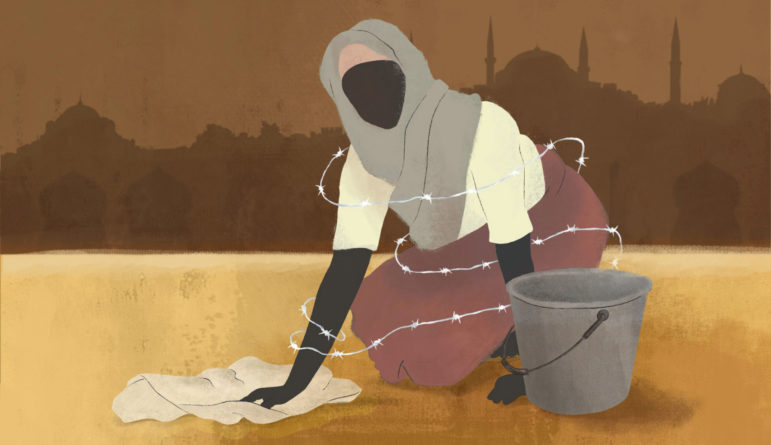

Illustration: Marcelle Louw for GIJN
Reporting on Migration in the Gulf: A Revised and Expanded GIJN Guide
Illustration: Marcelle Louw for GIJN
The six Middle Eastern countries of Saudi Arabia, Kuwait, the United Arab Emirates, Qatar, Bahrain, and Oman present a series of unique and often difficult challenges for investigative journalists due to their widespread restrictions on press freedom and threats to reporters’ security.
As a result, covering critical issues such as worker abuse, forced labor, and human trafficking can prove daunting without insight into the region’s economies, immigration and legal systems, and informal customs.
For these reasons, GIJN and Migrant-Rights.org have collaborated to update and expand this extensive multilingual guide to educate journalists on best practices, tools, and country-specific resources for covering the Gulf’s 23 million migrant workers, against the backdrop of the ongoing COVID-19 pandemic.
As an introduction to the topic, we’ve condensed some of the most helpful lessons and takeaways below.
Read the full guide here, and visit the GIJN Resource Center for more tools and techniques.
Finding Stories
Local organizations and embassies are helpful sources for journalists reporting on trafficking and forced labor. New, recently passed, or recently enforced legislation is also a starting point for stories. There’s often not much substantive follow-up on the implementation of legislation and how it affects migrant workers (for example with comprehensive interviews with workers, employers, recruiters, or government officials.) Measuring the impact of reforms to the wage protection system and sponsorship system are examples of valuable, and much-needed, stories. Detention centers are also a major source of information, if you are able to talk your way in. Understand what forced labor is and spot patterns in seemingly unrelated news. For instance, a report about a disease or virus outbreak in labor accommodation may give you a clue when investigating worker conditions. Investigate how an economic recession has repercussions on labor mobility: the far bigger story of human strife often gets buried under coverage of the national economic fallout.
Fair Coverage
Make sure migrant perspectives are included in your reporting, and ensure those viewpoints are varied. Migrants from different countries and working in different sectors are likely to have different opinions and stories to tell, make sure you tell their stories rather than recycling government press releases. Remember that victims of trafficking or other traumatic experiences often struggle to recall events in chronological order, and their stories may change. This does not mean they are lying. Be sure to get the consent of anyone who is photographed or interviewed, and confirm they understand your request. Remember you cannot obtain the consent of a deceased worker, so be cautious covering these stories. Special care needs to be taken with workers who have experienced abuse. Make sure your work does justice to the worker’s experience. Be careful with your language. There’s a tendency in both English and Arabic-language media to use words that dehumanize migrants and advance negative stereotypes.Our glossary offers suggestions on best-use terminology.
Be Cautious
Protecting both yourself and your sources is of utmost importance. Make sure you have any necessary permits or special visas for your work. Be sure to request a response from government departments, if relevant, to ensure your coverage is fair and to help avoid defamation claims. Protect workers’ privacy. Make sure you use pseudonyms for migrant workers if they are undocumented or if they might face a backlash from their employer. If you’re reporting on a migrant worker in distress, sometimes it’s best to wait until they’ve been helped or repatriated before publishing a story. Don’t publish documents that reveal workers’ passport numbers or national IDs. Use encrypted messaging applications, like Signal and WhatsApp, and encourage your sources to do this as well. If you can’t publish an important story in a local publication for security reasons, pitch it to international publishers or publishers in a migrants’ country of origin, even if it’s without a byline, since it’s important to get these stories out.
Data and Statistics
Keep in mind that most global data related to migration doesn’t adequately represent the Middle East and Gulf regions because of the lack of data in these countries. Also remember that data doesn’t always differentiate between labor, forced migration, and refugees. Don’t take official statistics at face value. Check the definitions used to determine things like the number of trafficking incidents or the methodology used to calculate the number of complaints lodged by workers. Keep an eye out for English language news from migrants’ countries of origin. There are often statistics on populations in the region, the most popular migration destinations, the number of complaints workers have made in particular countries, and related issues. Get in touch with reporters and see if they might connect you with their sources or ask if they can help with more information.
Additional Resources
Human Trafficking: Investigating An Evil Hidden in Plain Sight









